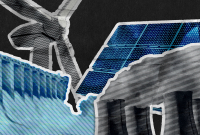Support strong Canadian climate journalism for 2025
BP wants to expand and supply natural gas in New Brunswick, according to an application filed to the provincial regulator. The application said the company would not be selling directly to residents and was filed to the New Brunswick Energy and Utilities Board on Oct. 25 — four days after Premier Susan Holt was elected.
“It shows that they have a renewed interest in the Maritimes and shows that they're thinking long term,” Mario Levesque, a political science professor at Mount Allison University, told Canada’s National Observer in a phone interview.
“It's not going to change over the next year or two or three, but … they're kind of lining up their ducks in order to be prepared on the ground for when things do change.”
In documents filed with the provincial regulator, BP said it is “looking to expand to offer natural gas supply into the province of New Brunswick to commercial customers.”
The application says BP does not have any gas delivery operations in New Brunswick currently. Liberty Utilities is the main company delivering gas to customers, along with Park Fuels Inc. and Irving Energy Services.
“If BP’s request to market more gas into the province is approved, then … it also, in a roundabout way, gives a larger footprint for the gas industry in the province,” Levesque said.
BP’s application asks for permission to supply gas, not to develop gas resources in the province, but natural gas development in New Brunswick has long been a politically difficult issue. In 2014, a fracking moratorium was instituted by the Liberals under Premier Brian Gallant.
Political watchers say it's unlikely the current Liberal government would reverse the moratorium its former administration put into place, but some factors could potentially change that.
For example, the situation might change if First Nations and industry came to the table together and made a case for reopening natural gas development in the province, David Campbell, president of Jupia Consultants Inc. and former chief economist with the New Brunswick Jobs Board Secretariat, said in an email to Canada’s National Observer.
Levesque agrees that scenario, if realized, could put pressure on Holt’s Liberals to walk back the moratorium or make some smaller concessions to allow development.
How President-elect Donald Trump’s tenure plays out could also be a factor if U.S. policies cause a large disruption to the economy, he added.
Holt has panned former Premier Blaine Higgs’ pro-fracking stance, but in summer 2023 the Liberals voted against the Green Party’s bill to ban oil and gas exploration and drilling within the province’s borders.
When it comes to energy and development, Levesque said Holt is “very clever” and “plays both sides of the fence,” particularly during her recent election campaign to navigate ideological splits in anglophone and francophone regions.
Holt needs the support of French-speaking regions, as well as some English ridings to maintain her government’s position: Anglophone ridings lean a little more right and toward business interests, so she is left “trying to thread a needle” with her messaging, Levesque said.
BP did not respond to a request for comment by deadline.
In an emailed statement to Canada’s National Observer, the provincial Department of Natural Resources said it is “pleased to see continued competition in the sale of natural gas in the province,” and “confident in the expertise of the Energy and Utilities Board to make decisions with respect to marketer’s certificates.”The process is regulated by the board.
“More marketers mean more competition for consumers, making energy more affordable. Commercial businesses are facing increasing costs of doing business and opportunities to lower their energy costs is good news,” the statement reads, adding natural gas “will remain an important transition fuel in the province.”
At the same time BP is looking to supply gas in New Brunswick, the province is increasing its reliance on gas-fired power to deal with rising electricity demand.
A new gas-fired electricity plant announced in Scoudouc, a community about 20 kilometres northeast of Moncton, “may be a game changer,” according to Levesque.
New Brunswick Power plans to buy power generated at the new 400-megawatt gas-fired electricity plant, according to reporting by the Telegraph-Journal last week. The plant would get its gas from the Maritimes and Northeast Pipeline, reported CBC.
New Brunswick Power has not announced which company will build the gas plant and told Canada’s National Observer it will report that information once due diligence is complete.
The new plant would supply baseload power when electricity demand is high and reduce reliance on an oil-burning generating station in Coleson Cove. The province anticipates an estimated 60 per cent increase in electricity demand from now to 2035, largely driven by industrial demands.
On Dec. 8, the federal government announced over a billion dollars in investments to help New Brunswick meet the demand for clean electricity. This includes investing in Indigenous-led wind projects, funding SMR development and a commitment to help convert the province’s coal fired plant to run on biomass.
— With files from John Woodside
Natasha Bulowski / Local Journalism Initiative / Canada’s National Observer
This article was updated to correct the year the Green Party's bill was defeated.






Comments